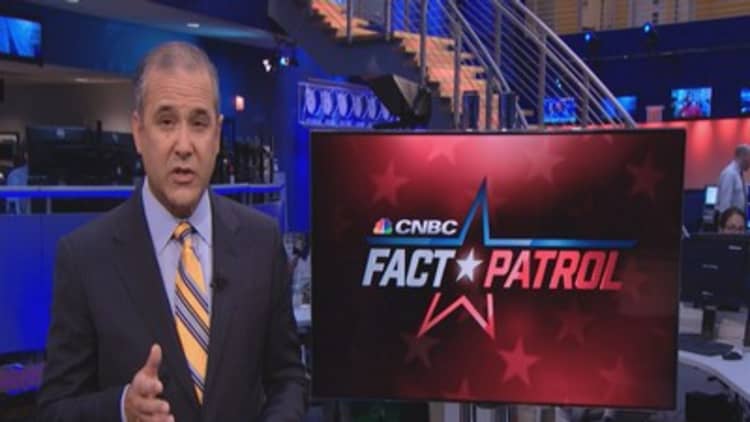
Immigration is Donald Trump's biggest campaign issue, but in Wednesday night's CNBC Republican Presidential Debate he tried to walk away from one of his talking points. He didn't get far, however, before catching the watchful eye of the CNBC Fact Patrol.
Trump has been sharply critical of a bill co-sponsored by Sen. Marco Rubio that would expand the H1B visa program for skilled workers. The proposal has the backing of many big tech companies including Facebook, prompting Trump to refer to his presidential rival as "(Facebook CEO) Mark Zuckerberg's personal senator."
Asked by debate moderator Becky Quick about the charge, Trump denied ever saying it.
"Somebody's doing some really bad fact-checking," he added.
A direct challenge to the Fact Patrol, but not a particularly difficult one. While it's unclear whether Trump himself ever actually uttered the words, they do appear on his campaign website.
"Mark Zuckerberg's personal Senator, Marco Rubio, has a bill to triple H-1Bs that would decimate women and minorities," the site says.
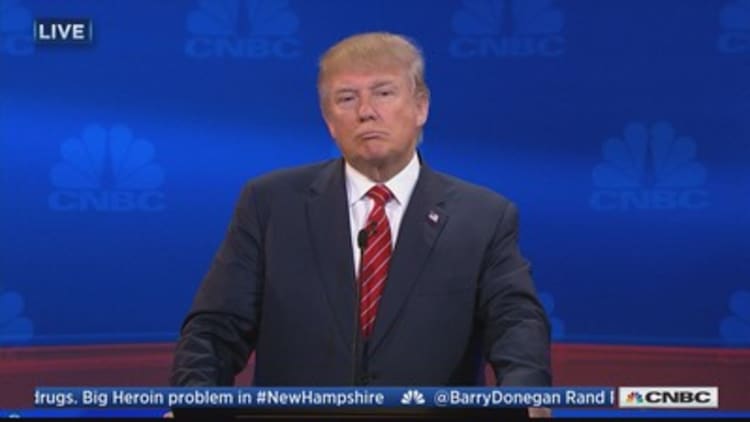
When Quick pointed the quote out to Trump later in the debate, he still did not acknowledge it. But he also appeared to soften his stance on H1B visa expansion.
"I'm in favor of people coming into this country legally," he said.
"And you know what? They can have it any way you want. You can call it visas, you can call it work permits, you can call it anything you want."
By the time we published this article, however, the language on the website is unchanged.
Trump also promises to bring jobs and manufacturing back to the U.S. from countries such as Mexico. But in at least one instance Wednesday night, he overstated the problem.
"You probably saw Nabisco is leaving Chicago with one of their biggest plants, and they're moving it to Mexico," Trump said.
Except that's not happening, according to Irene Rosenfeld, the CEO of Nabisco's parent company, Mondelez International.
"My most sane message to Mr. Trump is to get your facts straight," Rosenfeld told CNBC Wednesday.
While the company has said it is moving some 300 jobs from the Chicago area to Mexico, the plant is not closing. In fact, Rosenfeld said, the company is investing $170 million in capital improvements at facilities in New Jersey, Virginia, and Illinois.
Trump also again defended the four bankruptcy filings by his casino companies in Atlantic City, New Jersey, as smart business.
"I've used (the bankruptcy laws) to my advantage as a businessman, for my family, for myself," he said, but noted, "I never filed for bankruptcy."
While it is true that Trump has never filed for personal bankruptcy, the Fact Patrol examined court documents dating to the first filing, by Trump's Taj Mahal casino in 1991. In three of the four filings, Trump was either the sole shareholder or lone board member. That meant he personally signed each of the filings, and the board resolutions were in his name. Only the fourth bankruptcy, by Trump Entertainment Resorts in 2009, is not in his name. By that point, Trump was no longer a majority owner of the company.
In that respect, Trump's bankruptcies may indeed have been shrewd business moves. They allowed him to extricate himself from his ill-fated bet on Atlantic City in the late 1980s, ultimately transferring the risk to lenders, investors, contractors and other creditors.
Do Fiorina’s claims compute?
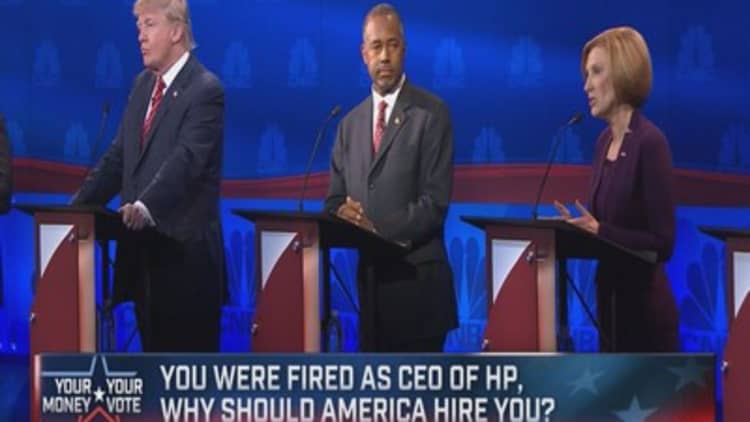
Former Hewlett-Packard chief executive Carly Fiorina also faced tough questions about her business record. She headed the technology company from 1999 until she was fired in a messy boardroom battle in 2005.
Fiorina likened the company to the federal government — "a bloated, inept bureaucracy that cost too much and delivered too little" — and said she made "tough calls in some tough times" as the technology bubble burst.
"(W)e saved 80,000 jobs and we went on to grow 160,000 jobs," she said. But she failed to note that the job growth was almost entirely the result of the controversial purchase of Compaq Computer Corporation in 2002. She also failed to note that HP's profits fell sharply as it tried to absorb its rival — a personal computer company purchased at the dawn of the smartphone era.
Fiorina also took aim at Democratic front-runner Hillary Clinton.
"It is the height of hypocrisy for Mrs. Clinton to talk about being the first woman president when every single policy she espouses and every single policy of President Obama has been demonstrably bad for women," she said.
But Fiorina's figures appear to center on the job losses during the first three years of the Obama presidency, while ignoring job gains beginning in 2012 and beyond, according to U.S. Bureau of Labor Statistics data. From February 2009 through January 2013 — Obama's first term — overall employment rose by just over 2 million jobs. But it is true that women returned to the workforce at a much slower pace than men, adding just 614,000 jobs. Since then, however, the trends have begun to even out.
For the entire Obama presidency through September, women made up about 4 million of the 9 million jobs added, or about 45 percent.
Attendance record
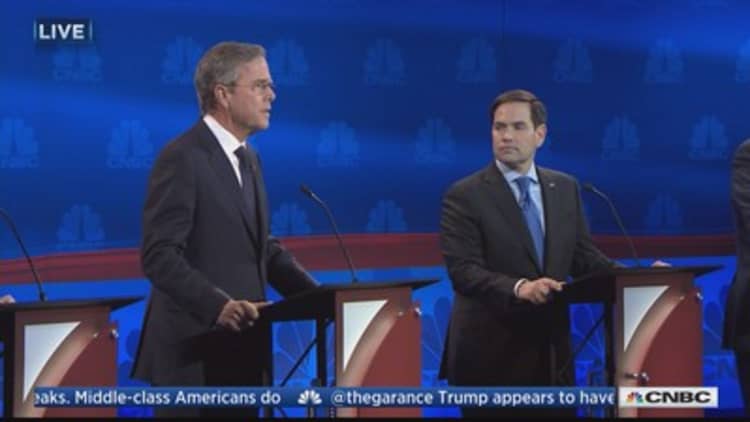
In one of the sharpest exchanges of the evening, former Florida Gov. Jeb Bush blasted Rubio for his attendance record in the Senate since launching his presidential campaign.
"Marco, when you signed up for this, this was a six-year term, and you should be showing up to work," Bush told his fellow Floridian. "I mean, literally, the Senate — what is it, like a French work week? You get, like, three days where you have to show up? You can campaign, or just resign and let someone else take the job."
Rubio claimed his attendance record was better than former Massachusetts Sen. John Kerry during his 2004 presidential run, as well as then-Illinois Sen. Barack Obama and Sen. John McCain during the 2008 campaign.
"I don't remember you ever complaining about John McCain's vote record," Rubio said. "The only reason why you're doing it now is because we're running for the same position, and someone has convinced you that attacking me is going to help you."
In fact, the Fact Patrol found Rubio is correct in claiming Kerry and McCain had worse attendance records, but he understated Kerry's tally, who missed 85 percent of votes up to this point in the 2003-2004 campaign. McCain missed 59 percent between his announcement and late October 2007, according to an NBC News tally, compared with Rubio's 47 percent. But Obama missed only 30 percent of his votes by this time during the 2007-2008 campaign.
Budget battles
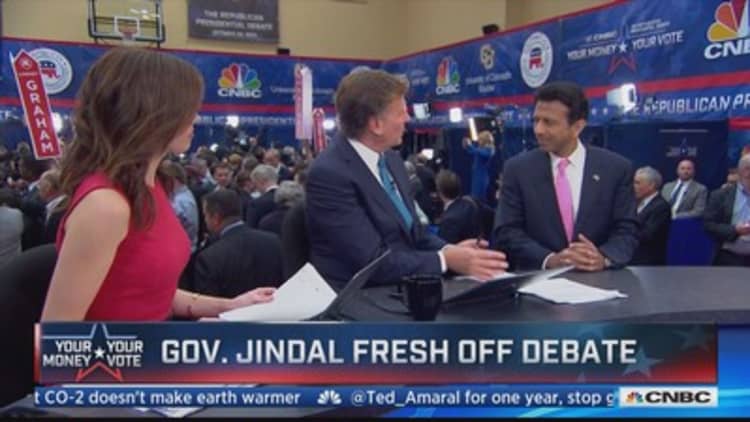
The Fact Patrol was also on duty during the opening session of the debate, which featured four candidates who did not make the threshold of 3 percent in an average of national polls to appear in the main event. The first debate featured sparring over who was best at cutting the size of government.
Louisiana Gov. Bobby Jindal claimed to be the only candidate who actually did so.
"What we did is we cut state spending. We've cut our budget 26 percent according to Cato and other analysis," Jindal said.
It is a slight variation on a claim he has made in the past, but it is not necessarily any more accurate.
The 26 percent budget reduction since Jindal took office is 2008 is almost exactly equal to the amount of federal aid following Hurricanes Katrina and Rita that ran out during that time, according to the Louisiana Office of Planning and Budget. Take out the aid and adjust for inflation, and Jindal can still claim he kept spending roughly flat compared with his predecessor, Kathleen Babineaux Blanco. Even the libertarian Cato Institute, which Jindal cites in his claim, said in a June blog post that he cut spending by 7 percent, not 26.
George Pataki insisted he shrunk government as well when he was New York governor from 1995 to 2006.
"By the way, Bobby, I shrunk the size of New York State's government," Pataki said. "When I left, we had reduced the employment by over 25,000 and cut taxes."
Pataki did cut taxes and he did cut state employment — though not by as much as he claims. New York State budget documents show government employment fell by just 13,000 employees — not 25,000 — while Pataki was in office. And the size of the state budget rose by almost $13 billion, outpacing inflation.
Defense equation
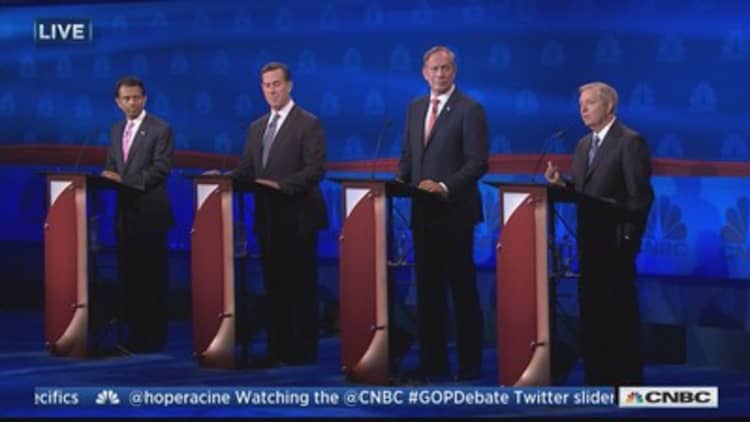
South Carolina Sen. Lindsey Graham focused on national security in the first debate, and said that was why he supported the budget deal between the White House and Congress.
"There are more terrorists with safe havens than any time since 9/11," Graham said, a claim that appears to come from a Terror Threat Snapshot released this month by the House Homeland Security Committee.
The budget deal would restore some military spending in exchange for increasing other domestic spending, which Graham defended.
"I am looking at this budget with one view in mind. Will it restore the ability to defend this nation? We are on track to have the smallest Army since 1940; the smallest Navy since 1915," Graham said.
The claim echoes similar statements from Republican presidential nominee Mitt Romney in 2012, and they remain problematic.
The Army Times did note in February that active duty soldiers were set to drop below 490,000 this year, before the budget deal. That would be down from 547,000 in January. But it is still not the smallest since 1940. In fact, it would be the lowest since 2005, when the number hit 488,944. The number hovered below 500,000 for most of the George W. Bush administration. In 1940, the year before the World War II draft began, the Army had just 269,000 active duty soldiers.
As for the Navy, it is the smallest since 1915 if measured by the number of ships. But naval warfare has changed considerably over 100 years — including the advent of the aircraft carrier. That means Graham is basically comparing apples to oranges.
CORRECTION: This story was updated to correct that Kerry had missed 85 percent of Senate votes up to this point in the 2003-2004 presidential campaign.


